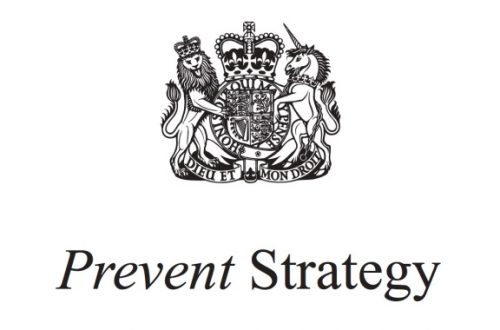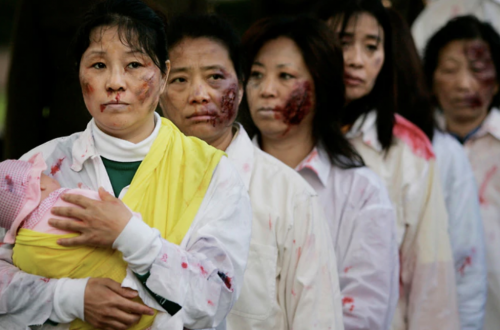Further footage has recently been released from Islam.net’s 2013 event in Norway – see this earlier post for some background. The main speaker is our old friend Haitham al-Haddad. Whatever his faults, evasion isn’t one of them. Fahad Qureshi and Yusuf Chambers are also present and it’s important to note that Chambers at no point takes issue with any of Haddad’s pronouncements.
Here are a few lowlights. Haddad compares stoning for adultery with assisted dying and insists adulterers welcome the punishment.
37:17 “Now once they talk about sharia as a barbaric system they give the example of stoning women to death. Yes? I’m not running away from any example. Stoning adulterers to death, and they say that this is barbaric. I ask everyone one question: what about if this is the choice of the woman herself, the woman herself? What about if that is her choice? She chose to die like this. She prefers to die like this. She wants to die like this. Should we give her that choice or not? This is her choice. According to your own standard everyone is free to choose whatever he wants to do and she prefers to die like that. In euthanasia now, people die in different ways and now there is a strong advocasy for the legislation of euthanisia. You know euthanisia, yes? People like to die in a particular way. And this woman who committed a certain crime she wants to die like this. This is the way she prefers. It is not only applied for women it is also applied for men when they violate certain rules and they are the people to choose. They prefer this.”
At 54:11 Chambers thanks Haddad with unqualified enthusiasm:
“Jazakallah Sheikh Haitham for that very enlightening talk on sharia barbaric or correct.“
Then, in the Q and A session (58:34) Haddad is asked about the death penalty for apostasy.
1:00:31 “From an Islamic perspective the biggest loyalty is the loyalty to Islam as a whole not to a political entity, which is more comprehensive than loyalty to a political identity and moreover the apostate from an Islamic perspective is not going against his religion because Islam is not a religion, Islam is a way of life. So he will be changing his way of life including his political allegiance, including his religious allegiance, including everything, so definitely this person will be a threat for the state, for the individuals, for everyone. And that’s why the punishment is capital punishment.”
At 1:02:58 Haddad is asked whether, if a person leaves Islam in private and doesn’t announce his decision, the punishment still applies. He insists apostasy is always a public act.
1:03:13 “This is impossible. Why? Because Islam is a way of life. Have you ever seen a Muslim who practices Islam and you could not distinguish whether he is a Muslim or he is not a Muslim? No. Because definitely if a person is a Muslim and practicing Islam, that will change his life. So if he leaves Islam that will change his life. So you cannot say that he will do it privately, no one will know about it. This person will leave salat completely. We will be able to know whether this person is still praying or not? Agree or not? Yeah? Imagine if the person is a sister, and this sister, when she leaves Islam will she continue wearing hijab? Of course not. Yes? Moreover, even the political allegiance, this person who left Islam, he will be the first enemy to Islam and Muslims, and to Islam and Muslim countries. So you cannot imagine that a person will change Islam to non-Islam and it remain a secret or private.”
A good many Muslims insist, by contrast, that any punishments for apostasy are unislamic. Obviously this is very welcome. What is less helpful is when, as sometimes happens, they seem reluctant to acknowledge that other Muslims, Muslims who certainly consider themselves ‘mainstream’, think otherwise. When ex-Muslims and others raise the issue they are sometimes accused of being deluded or bigoted. But the evidence suggests that Yusuf Chambers approves Haddad’s views on apostasy. Chambers, as you will probably remember, is one of the founding members of iERA – hardly a marginal figure or outlier. Here’s how he is described on the iERA website:
Yusuf has been involved with a number of leading Muslim organizations; both in the UK and abroad. His work has often focused around community projects He is a prominent da’ee who delivers lectures around the country. Yusuf has also traveled extensively to give dawah including Mexico, India and Kuwait. He is also a regular on many television channels including Peace TV and Islam Channel. He is one of the Founding members of iERA
He’s not only well regarded in (some) Muslim circles – he has shared a platform with others purportedly campaigning against hate. Here Mehrdad explains how Neil Denton , of “Agencies Against Crime and Harassment”, apparently spoke alongside Chambers and failed to respond to Mehrdad’s concerns about this decision. [Update: Lamia helpfully reminded me, in the comments, that Denton did in fact go on to engage with the questions raised by Mehrdad.)]
It’s as though people like Chambers are protected by some kind of cloaking device which makes their views invisible both to non-Muslim liberals like Denton and some Muslim liberals too.
In the Islam-net video Chambers criticises Laurence Krauss for asserting that there is no ‘objective morality’ (54:40) But his group seems keen to pressurise people to condone any belief or practice, however appalling, if it can be described as part of ‘normative’ Islam, in other words to embrace a culturally relativist morality. This tactic can be seen in iERA’s indignant letter to the Telegraph challenging it to define extremism
iERA’s position as a Muslim missionary group towards extremism is very clear, and our material in the form of press releases, videos, lectures and articles are abundant. As the editor of a prominent UK newspaper, you are aware that prior to publishing an article, it is ethically and principally incumbent on the publication to offer the opportunity of fair comment to an organisation or an individual when claims such as those made by Mr Gilligan in his article.
‘Extremism’ is an ambiguous term which is frequently used by the media with little regard to the wider impact it has on society, forging an ill-informed perspective on Muslims. Sadly, the term extremism has become a political tool to demonise and censor normative Islamic beliefs. By coining mainstream concepts under the umbrella term of extremism, Mr Gilligan amongst other journalists, are fuelling an atmosphere of hate and fear of Muslims, which will inevitably hinder the process of community cohesion.
Quoting speakers out of context is unprofessional and misleading. Extracts of previous lectures should not be referred to in isolation, to depict certain members of our organisation as extreme, homophobic or anti-Semitic. The same speakers have clarified their theological opinions within a particular context, and engaged in projects which controverts the conclusions drawn by Mr Gilligan in numerous articles on iERA, but they were clearly ignored.
Extremism is indeed an ambiguous term., but I think most readers will agree that calling for apostates to be killed (in an ideal state) is an extreme and abhorrent view. The video seems to provide a full and complete context for Haitham al Haddad’s words. If the bit where Chambers indignantly refuted his views on apostasy have been sneakily edited out, we’ll post a correction. But until then it seems reasonable to conclude that he, like Haddad, is an extremist.


